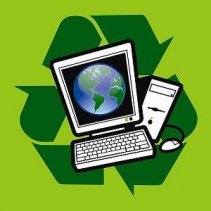Computer Environmental Issues
A typical computer has many negative influences on the environment, anywhere from the manufacturing of computers to the distribution of computers. This has caused many questions and awareness among individuals who are concerned with the negative influences on the environment; which may cause hurdles for the new generations to come. There are various ways one should manufacture, buy, use and dispose computers so the negative impact on the environment can be reduced.
E-trash/E-waste
E-trash/e-waste is any refuse created by discarded electronic devices and components as well as substances involved in their manufacture or use. E-trash is particularly significant because disposal of electronic items results in toxic waste that is products containing dangerous metals like lead, cadmium and mercury which can contaminate air and water when they are dumped. In a personal computer, for example, there may be lead in the cathode ray tube (CRT) and soldering compound, mercury in switches and housing, phosphor to the front of a CRT screen, mercury powder in Flat screen backlights and cobalt in steel components.
Concern about the environmental issues surrounding e-trash has led governments across the world to implement laws prohibiting its disposal in landfills and issue directives on recycling. In the European Union, for instance, some responsibility was placed back on the manufacturer in the form of directives which make them financially or physically responsible for their equipment at the end of its life (and thereby provide a competitive incentive for companies to design “greener” products). In the United States initiatives mostly come from the private sector, such as eBay’s Rethink project.
According to the article, "Electronic Waste: Where does it go and what happens to it", a January 2011 NPR story shows us that companies might not be as honest about what they are doing with your old electronics. More often than not these items are shipped outside of the United States, moving the toxic waste dump from our shores to developing countries, according to Basel Action Network executive director Jim Puckett. The non-profit organization focuses on protecting the environment from dangerous waste.
Pucket goes on to say, '“The dirty little secret is that when you take [your electronic waste] to a recycler, instead of throwing it in a trashcan, about 80 percent of that material, very quickly, finds itself on a container ship going to a country like China, Nigeria, India, Vietnam, Pakistan — where very dirty things happen to it, ”" Puckett said to NPR.
While recyclers do make money selling metal scraps, such as gold and liquid solder, it is cheaper to have the hard labor of pulling apart and melting down pieces done outside the country even if that means the useless scraps and other hazardous materials will liter that area. For example, 60 Minutes went to one of these illegal electronics stripping shops in Guiyu, China, which employed workers for $8 a day. Despite the fumes that made the workers cough and other health hazards, the workers said they opted to work at recycling factories because it was one of the only jobs in this region that paid a living wage.
The environmental damage on the area because of all the toxic materials has left a permanent scar. Scientists who have examined Guiyu have determined that because of the waste, the location has the highest levels of cancer-causing dioxins in the world. Pregnant women are six times more likely to suffer a miscarriage, and seven out of ten kids have too much lead in their blood. Many of the devices broken down in the town came from other countries including the US, who in 2008 according to Natural Resources Defense Council Allen Hershkowitz tossed out 130, 000 computers each day and dispose of over 100 million cell phones each year.
Basel Action Network suggests taking an extra step and using one of the e-Stewards, certified recyclers that do not ship their electronic waste to be disposed of in different countries. It may narrow down the choices of where you can dump your old computer or cell phone, but the extra effort is worth it.
Disposal/Recycling[edit]
Disposal/recycling is a technique used to discard/reuse any unwanted merchandise, in this case computer technology.
There are several steps one should take whether the computer equipment is being disposed of or if it is being donated.
- Remove/Reformat Hard Drive
Deleted files may be recovered from the hard drive and sometimes even a reformatted hard drive.
All company information should be removed to prevent hackers from being able to identify where recovered information may have come from.
Have the recipient of the used equipment sign that they are accepting responsibility for proper disposal.
If the used equipment is brought to a recycling company, request written documentation that they are taking responsibility for proper disposal. If the documentation cannot be provided, this would be a sign that the recycling company is not legitimate.











